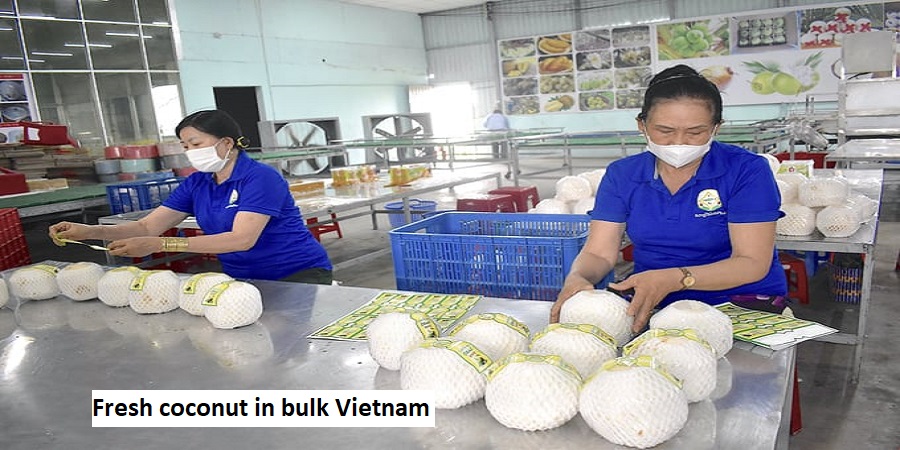
Fresh coconut in bulk Vietnam daivietinternational.com The coconut industry in Vietnam has a storied history and continues to play a crucial role in the nation’s economy and cultural fabric. Coconuts were first cultivated in Vietnam over 1,000 years ago and have since become a staple in various regions, particularly in the Mekong Delta, where the favorable climate and soil conditions allow for optimal growth. Today, Vietnam ranks as one of the leading producers of coconuts globally, exporting to numerous countries and generating significant revenue for local economies.
The Coconut Industry in Vietnam
The economic impact of the coconut industry is notable, providing livelihoods to millions of farmers and laborers. In areas where coconuts thrive, such as Ben Tre, Tra Vinh, and Da Nang, farmers have diversified their crops to include various coconut-derived products, such as coconut water, oil, and flesh. These products not only fulfill domestic demand but also cater to international markets, marking the coconut as a vital export commodity. The growth trends in this sector have shown a consistent upward trajectory, with increasing global interest in healthy and organic food options, further amplifying demand for coconut derivatives.
Despite the ongoing success of the coconut industry, farmers face various challenges, including climate change, pests, and fluctuating market prices. To mitigate these issues, initiatives aimed at enhancing production sustainability and improving quality have emerged. These include adopting organic farming practices, investing in modern agricultural techniques, and forming cooperatives to better support local farmers while promoting sustainable growth in the coconut sector.
Sourcing Fresh Coconuts in Bulk
Sourcing fresh coconuts in bulk from Vietnam is both an efficient and cost-effective method for businesses looking to supply their demands consistently. The process begins with identifying reliable suppliers who can guarantee high-quality coconuts. Factors such as the supplier’s experience, reputation, and certifications should be evaluated to ensure that they adhere to international quality standards. Key regions in Vietnam known for coconut production, such as Ben Tre and Tra Vinh, are often sought after for their diverse varieties, including the popular green and brown coconuts.
After establishing relationships with suppliers, the next step involves logistics. Shipping fresh coconuts requires careful planning to ensure they reach their destination in optimal condition. Proper packaging is crucial, and suppliers often employ methods to maintain freshness and reduce spoilage during transit. Coordination with logistics companies familiar with perishable goods can improve efficiency and minimize lead times. Understanding the supply chain and opting for refrigerated transport can further ensure the coconuts retain their freshness upon arrival.
Quality checks play a significant role in the sourcing process. Prior to shipping, bulk orders should undergo inspections to verify the quality and size of the coconuts. This may include checking the exterior for any imperfections and ensuring proper hydration levels, which can be indicative of freshness. Working with local farmers allows businesses to gain insights into coconut varieties and market trends, ensuring that they are well-informed about the availability and pricing fluctuations that can affect purchasing decisions.
Additionally, sourcing directly from Vietnamese producers supports local agricultural communities, which is increasingly becoming an important consideration for responsible sourcing. Establishing long-term partnerships with farmers not only fosters trust but can also lead to better pricing and consistent supply, ensuring that businesses have access to the freshest coconuts throughout the year.
Uses and Benefits of Fresh Coconuts
Fresh coconuts are an incredibly versatile ingredient that serves a variety of purposes in both culinary and non-culinary contexts. The coconut palm, often referred to as the “tree of life,” provides an array of products, each with its distinct flavor profile and health benefits. One of the most notable benefits comes from coconut water, a naturally refreshing beverage packed with electrolytes, vitamins, and minerals, making it an excellent alternative to sugary sports drinks. Its low calorie count and hydrating properties make it suitable for health-conscious consumers seeking natural rehydration after workouts.
The meat of the coconut is another valuable component, rich in dietary fiber, healthy fats, and essential nutrients. It can be enjoyed fresh, shredded, or dried, allowing it to complement a variety of dishes, from tropical desserts to savory meals. Coconut meat is not only delicious but also provides health benefits, including improved digestive health and increased energy levels due to its medium-chain triglycerides (MCTs). MCTs are known for their potential weight management properties, as they may enhance fat burning and support metabolic health.
Coconut oil, extracted from the meat, has gained immense popularity due to its numerous applications. Beyond cooking, it is widely used in the cosmetic industry for its moisturizing properties and skin benefits, making it a sought-after ingredient in lotions, hair products, and even oral hygiene products. The growing trend towards natural and organic products has propelled fresh coconuts to the forefront of health and wellness movements. Consumers are increasingly drawn to the notion of incorporating coconut-based items into their diets, which can be found in drinks, snacks, and various food products.
As the demand for sustainable and healthful ingredients continues to rise, fresh coconuts hold a prominent position in the market, appealing to consumers who value natural options that contribute positively to their well-being.
